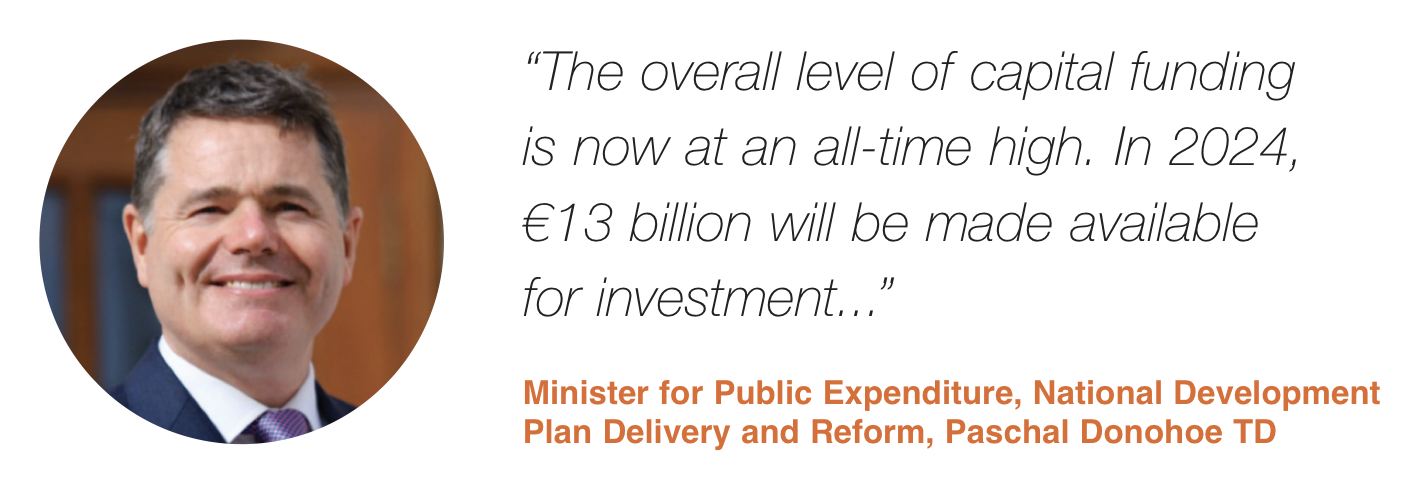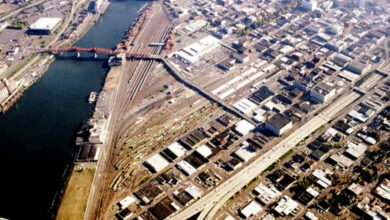PENDR Minister Paschal Donohoe TD: ‘Capital funding at all-time high’

Minister for Public Expenditure, National Development Plan Delivery and Reform, Paschal Donohoe TD outlines progress on National Development Plan (NDP) delivery to date, ongoing reforms in planning, developments in MMC, and further innovation in 2024.
The National Development Plan 2021-2030 sets out a positive vision for Ireland, which delivers total public investment of €165 billion over its lifetime. This expenditure will be pivotal in delivering the vital infrastructure we need to support our future economic requirements, climate change commitments and address our social investment needs.
The overall level of capital funding is now at an all-time high. In 2024, €13 billion will be made available for investment to provide more schools, homes, hospitals, and other vital infrastructure, that will make a real difference to people’s lives. An additional €2.25 billion of windfall corporate tax receipts is being allocated from 2024 to 2026, to be provided to critical infrastructure projects that are at an advanced stage as well as to the existing Climate Action Fund.
Our economy continues to perform strongly with record numbers in employment despite inflationary pressures. I would note the moderation in inflation evidenced in wholesale prices for construction products which increased by 0.3 per cent in the 12 months to December 2023. I would also like to highlight the significant progress being made under Housing for All, with over 32,000 new dwelling completions in 2023, which is a 10 per cent increase over 2022. The government recognises our thriving economy requires continued momentum in terms of increasing housing supply to meet our housing needs.

NDP delivery
The Economic and Social Research Institute (ESRI) published its report, The National Development Plan in 2023: Priorities and Capacity in January 2024. The report provides insights and recommendations on the NDP which I am considering in the context of updating NDP ceilings across different sectors for 2025 and 2026.
This update will give certainty to government departments on the level of capital funding available to them over the medium term. My officials and I are currently engaging with departments on this process. I am cognisant of the ESRI’s suggested approach in terms of prioritisation and the potential for the Government to direct construction activity towards those sectors where demand is highest.
In September 2023, I published the Prospects 2023/2024 report which sets out a clear pipeline of 50 of the largest individual projects that make up Project Ireland 2040. This pipeline spans projects which are currently at planning and appraisal to projects which are completing construction in 2024.
Another platform to communicate the range of projects and programmes under the NDP is the Project Ireland 2040 tracker and interactive map, which is updated every year. The tracker highlights the diverse range of infrastructure projects across Ireland and serves as a valuable resource for citizens, allowing them to track advancements and developments in their local area. The tracker and map are currently being updated by departments and agencies and will be released in Q1 2024.
Since Project Ireland 2040 was first launched in 2018, the Government has overseen the delivery of many impactful NDP projects across the country, including major third-level building projects such as the new university campus in Grangegorman, as well as better transport links, including upgrades on the N4 from Collooney to Castlebaldwin, from Gort to Tuam on the N17/N18 and the new N25 New Ross Bypass. In addition, hundreds of projects have been funded under the Rural and Urban Regeneration and Development Funds all across the country.
Ongoing reforms
In July 2023, I announced further measures to tackle uncertainty and risk in the delivery of Public Works Contracts. This follows a series of measures introduced by my department over the last two years to address the challenges that the construction industry has recently faced. Notable modifications include the introduction of caps on liability and reform of the price variation mechanisms.
In January 2024, I chaired a Project Ireland 2040 Delivery Board meeting where a range of issues, such as the backlog in planning applications and the restructuring of An Bord Pleanála to An Coimisiún Pleanála, were discussed. The Government is prioritising the Planning and Development Bill through the Oireachtas in 2024. The legislation introduces significant reforms in the judicial review processes, including the establishment of Urban Development Zones, which will empower local authorities to strategically advance development projects.
Building Information Modelling (BIM) has the potential to transform the design and management of construction projects. BIM can speed up the construction process, reduce waste, cut costs, and deliver projects to a higher quality.
Acknowledging the transformative role it can play, in January 2024, I introduced BIM requirements into the Capital Works Management Framework (CWMF). This requirement now applies to public work projects with a capital value of over €100 million. Over the next four years, these requirements will be extended to cover all public works projects.
As part of my reforms to the CWMF we are also adopting the International Cost Management Standard, which will bring benefits such as enabling consistent reporting of costs across the NDP.
MMC
The Construction Sector Group (CSG), which is overseen by my department, ensures regular and open dialogue between government and industry. The CSG and its associated innovation and digital adoption sub-group are driving seven actions, which are making substantial progress.
For example, ConstructInnovate (CI), which is the construction technology centre, is playing a pivotal role in meeting the infrastructure demands outlined in Project Ireland 2040. The research centre aims to make Ireland a global leader for sustainable construction and built environment technology.
Furthermore, there has been significant progress embracing modern methods of construction (MMC) in the construction sector with the Roadmap for MMC Adoption in Public Housing being published in July 2023.
A significant step in this roadmap is the roll out of the Accelerated Social Housing Delivery Programme, which targets delivery of 1,500 social homes, leveraging MMC approaches by the end of 2024.
In addition, the MMC Demonstration Park in Mount Lucas, County Offaly will be a crucial resource for developers and construction professionals facilitating the delivery of high-quality, affordable homes. A planning application has been submitted and phase one of the project is on target for completion by Q3 2024. Ernst and Young (EY) has been commissioned to assess the MMC skills need in the years ahead. An action plan for MMC skills will follow the publication of the EY report this year.
Further innovation
Another innovation currently underway is the digitisation of the planning application process across our 31 local authorities. The Local Government Management Agency (LGMA), under the governance of the CSG Sub-Group has rolled out an e-planning system in twenty-four LAs. The rollout to the remaining LAs will occur by Q2 2024.
Finally, we are aware of our emission reduction targets and with this in mind the CSG sub-group in conjunction with the RIAI and the Department of the Environment, Climate and Communications has developed Construction Sector Circular Economy Guidance. This report will be published in Q1 2024.
The introduction of BIM requirements to the CWMF in 2024 provides a clear line of sight to the construction industry and built environment in the transition to a more digital construction sector. This development will further increase productivity, support sustainability, and facilitate the delivery of the NDP.





